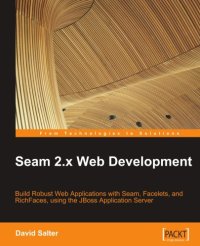
Ebook: Seam 2.x Web Development
Author: David Salter
- Genre: Computers // Networking: Internet
- Year: 2009
- Publisher: Packt Publishing
- Language: English
- pdf
Build robust web applications with Seam, Facelets, and RichFaces using the JBoss application server
- Develop rich web applications using Seam 2.x, Facelets, and RichFaces and deploy them on the JBoss Application Server
- Integrate standard technologies like JSF, Facelets, EJB, and JPA with Seam and build on them using additional Seam components
- Informative and practical approach to development with fully working examples and source code for each chapter of the book
In Detail
The Seam framework from JBoss allows developers to use JSF, Facelets, EJB, and JPA to write conversational web applications. But you will first have to learn how these standard technologies are integrated using Seam and how they can be built upon using additional Seam components. If you need to build a Java web application fast, but don't have time to learn all these complex features, then this book is for you.
The book provides a practical approach to developing Seam applications highlighting good development practices. It provides a complete walk through to develop Web applications using Seam, Facelets, and RichFaces and explains how to deploy them to the JBoss Application Server. You can start using key aspects of the Seam framework immediately because this book builds on them chapter by chapter, finally ending with details of enterprise functionality such as PDF report generation and event frameworks.
First, the book introduces you to the fundamentals of Seam applications, describing topics such as Injection, Outjection and Bijection. You will understand the Facelets framework, AJAX, database persistence, and advanced Seam concepts through the many examples in the book.
The book takes a practical approach throughout to describing the technologies and tools involved. You will add functionality to Seam applications after you learn how to use the Seam Generator RAD tools and how to customize and fully test application functionality. Hints and tips are provided along the way of how to use Seam and the JBoss Application Server.
What you will learn from this book?
- Understand the fundamentals of Seam and why Seam is different from many other web frameworks
- Develop web applications using the Facelets viewing technology as an advanced replacement for JSF
- Test all aspects of a Seam application including testing web pages and Seam components
- Utilize the RichFaces library for developing advanced, rich user interfaces including AJAX technologies for an improved user experience
- Develop persistent applications using the Java Persistence API (JPA)
- Build conversational web applications that can run over multiple browser windows and tabs without worrying about storing session data
- Secure applications using role-based security, CAPTCHA, and OpenId
- Easily use Facelets to render data as HTML/PDF/RTF/email
- Use JBoss Tools to rapidly enhance your developer productivity
Approach
Having developed enterprise Java applications since 2001, the author's experience enables him to provide a clear incremental approach to web development with Seam. Initially the book introduces Seam using Java Server Pages (JSP) as the view technology so that readers can quickly learn the key concepts behind Seam. Additional technologies used within Seam applications are then introduced chapter by chapter with each chapter building on the material previously learned. The book describes each technology, providing working examples and source code for each.
This is not a dry Seam reference book, but an exciting journey learning Seam, starting at the basics and progressing by the end of the book to more advanced enterprise features.
Who this book is written for?
This book is for Java EE application developers who are new to Seam and interested in developing with Seam 2.x.
You will need a basic understanding of Java EE and also to be aware of EJB3, although you do not need to know it in any detail. Experience with JBoss AS would be great, but all you really need is to be comfortable using any application server. Knowledge of AJAX and JavaScript would also be beneficial, although it is not necessary.